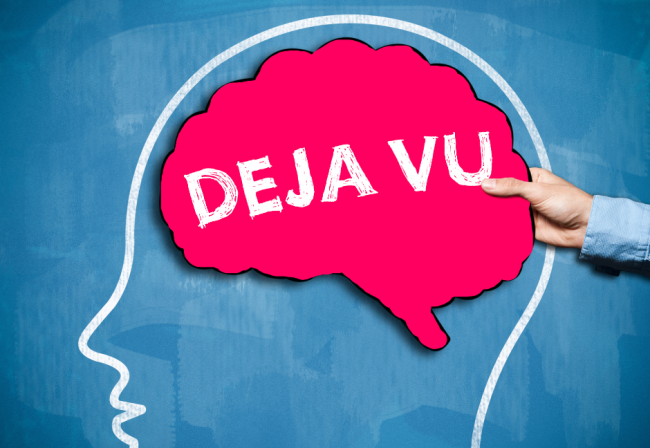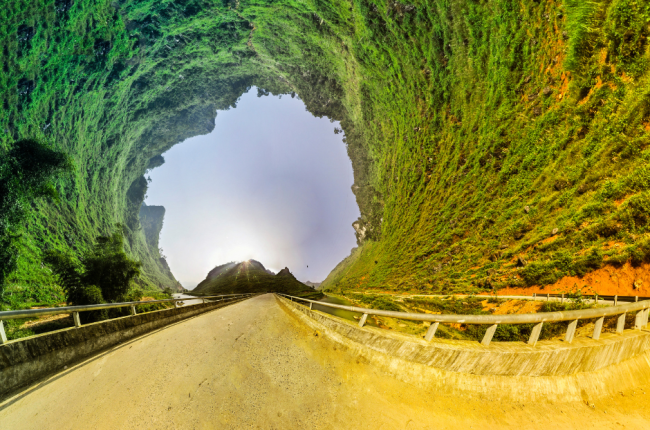What is Deja Vu
Ever had that moment where you feel you’re re-watching a scene of your life…even though it’s your first time there? Like you’re stuck in a Groundhog Day movie? It happens to about 97% of us.
Yep. That’s deja vu. Gifted to us by the French language, ‘deja vu’ gracefully translates to “already seen”.

What is Deja Vu – Explained
Our brains, for all their brilliance, sometimes have these brief mix-ups, making the present feel like a memory from the past. In these moments, it’s not about what we’ve truly seen. It’s about what our brains think they recognize.
Ever wondered why and how this happens? Join us as we explore the captivating phenomenon of deja vu.
The origins of the term deja vu
In 1876, French philosopher Émile Boirac introduced the term ‘deja vu’ in a letter to the editor of what is now the oldest French academic journal in philosophy. Boirac mulled over the idea: could déjà vu be remnants of memories we’ve somehow forgotten? This is potentially the first mention of the word in this form.
However, the feeling was there. Our ancestors were also experiencing deja vu. Throughout time, people have speculated its causes. In novels and poems we find ideas about reincarnation, dreams, natural factors and even memories lurking just beneath our consciousness. Modern research has suggested connections to false memories, temporal lobe epilepsy and other neurological factors.
Most research suggests that the temporal region of our brains is central to deja vu experiences in both the everyday person and those with specific medical conditions. But the true mechanics of it? Still a mystery. But don’t worry, we’ve got some thrilling theories to dive in.

Deja vu vs familiarity
In 1983, Doctor Vernon Neppe coined a fancy definition of deja vu. He called it “a subjectively inappropriate impression of familiarity of a present experience with an undefined past”. Simply put, it’s that quirky moment when you feel like you’ve been through something before, although you know that’s not possible.
There’s this odd mismatch when deja vu hits. It feels familiar, yet it isn’t. It’s different from, say, recognizing the scenes in your daily commute. Deja vu is when you’re hit with a sense that you’ve seen this exact video before, despite knowing for a fact that it’s a first time experience.
Now, scientists have been curious about this. Cognitive psychologist Anne Cleary and her team rolled up their sleeves and set up an experiment at Colorado State University. They created virtual scenes with subtle similarities – like how furniture was placed in relation to a painting. In a 2009 study, they found that these similar scenes made déjà vu spring into action more often. It’s as if the brain waves hello, saying, “Hey, this looks familiar!” even when it’s a totally fresh scene.
Basically, the research suggests that a tinge of familiarity might nudge deja vu into play, but it’s not a must. Other scientists claim that we are usually pretty sharp at distinguishing between similar stuff. So, when déjà vu pops up spontaneously, it might just be our brain having a little hiccup.
What might cause deja vu
Although there is no clear answer as to what exactly causes deja vu, scientists have focused on a possible connection with the memories stored in the temporal lobe of the brain.
Scientific endeavors suggest déjà vu as a memory-based spectacle. It’s like bumping into a scene that’s almost a carbon copy of a memory, but not being able to pull out that memory from the archives, leaving us with this eerie familiarity.
Our brain, in all its complexity, might sometimes fast-track a new piece of information straight to the long-term memory vault. So it skips the short-term memory pit stop. Or, perhaps, our rhinal cortex which usually rings the “this feels familiar” bell, gets triggered without a solid memory backing it up.
Over the years, scientists, with a mix of hypnosis and virtual reality, have tried to stage déjà vu in labs, aiming to unlock its mystery. For instance, a 2006 Leeds Memory Group venture created a hypnosis-induced memory in participants, later triggering déjà vu by either asking them to remember or forget the memory. Another study set up a déjà vu arena within the well-known virtual reality game called Sims, where participants experienced déjà vu as they navigated through scenes cleverly crafted to mirror each other.
False memories?!
Some theories even tiptoe into the realm of false memories, linking déjà vu to our inability to separate the real from the imagined. Yet, a study using functional Magnetic Resonance Imaging (fMRI) stirred the pot by revealing that déjà vu doesn’t really ring the memory bell in our brain. Instead, it sets the decision-making sectors abuzz. It’s like our brain is flipping through our memory rolodex, resolving any clash between what we think we’ve experienced versus the actual past scenes.
Yes, there are all sorts of contradictory theories on what deja vu really is and what causes it. Let’s check a few!
The split perception theory
The split perception theory about deja vu says that deja vu occurs when an object or scene is perceived on two separate occasions. How so?
Let’s assume you are on the hillside somewhere in Tuscany, but your attention is on your phone, not on the splendid view. Despite the fleeting or partial observation of those brilliant vistas, your brain begins to form a memory based on the limited information acquired, potentially capturing more details than you might be conscious of.

Then after an hour of scrolling, you decide to give the breathtaking views a chance thinking you’re seeing them for the first time. However, your brain retains the memory of the prior observation, regardless of your level of awareness at the moment, leading to an experience of deja vu.
Essentially, due to the lack of full attention during the initial perception, the experience might feel like two separate events when in reality, it’s a continuous perception of the same event being registered anew.
Minor brain circuit malfunctions
Another theory claims that deja vu arises from a temporary “glitch” in the brain’s electrical activity. Some scientists believe that it’s similar to the disruptions observed during an epileptic seizure. It happens when the brain’s present-event-tracking and memory-recall regions are active at the same time. In this way, we misinterpret current events as memories of past events. It’s a harmless “glitch” unless experienced frequently.
Following the same line of thought, experts have also proposed another hypothesis of why deja vu happens. Normally, information transitions from short-term to long-term memory via a certain pathway. However, occasionally, short-term memories bypass the usual route, directly entering long-term memory storage. If this happens, you will have the sensation of recalling a distant memory instead of a recent event.
Memory recall
As we have seen so far, specialists haven’t yet pinned down the exact reasons why deja vu happens. There of course are several theories. Most of them have to do with the way memories are processed in the brain and retrieved.
Studies led by Anne Cleary, a notable déjà vu investigator and psychology educator at Colorado State University have indicated this connection. According to Cleary and her team, deja vu may occur as a reaction to a scenario resembling a past experience that is not within our conscious recall.
What does this mean? Take an event from childhood or a forgotten experience. The full memory is not accessible to us, yet the brain recognizes the resemblance, leading to a peculiar sense of familiarity. It’s a process known as implicit memory. If the memory were accessible, making a connection between the two scenarios would likely prevent the feeling of deja vu.
Scientists point out that this phenomenon often manifests when individuals encounter, say, a natural landscape which bears the resemblance to a forgotten memory. Anne Cleary has further delved into this notion in a 2018 study exploring the feelings of premonition often accompanying deja vu experiences. So, it’s not uncommon for individuals to feel a strong certainty of foreseeing things during a deja vu episode.
All in all, according to the memory recall theorists, people tend to experience deja vu more frequently when exposed to scenes resembling their forgotten memories.
Is Deja Vu Normal?
Experiencing déjà vu is not an uncommon or harmful phenomenon. According to various studies, deja vu is more common among individuals aged 15 to 25.
Although not entirely understood by researchers, a higher frequency of deja vu has been associated with a couple of factors. These include: a higher level of education, frequent travel, the ability to remember dreams.
All in all, deja vu is relatively rare in healthy individuals, typically manifesting a few times a year. However, if the frequency of deja vu experiences increases or is coupled with other symptoms, it is advisable to seek medical attention.
While having a deja vu is not like having a seizure, in certain cases, it could indicate temporal lobe epilepsy. However, in this case, it should also coincide with other symptoms, such as loss of awareness, shaking, tongue-biting or confusion.
So, deja vu is normal if it happens a few times a year and it doesn’t come associated with other symptoms. However, should your déjà vu episodes be accompanied by confusion, headaches, loss of awareness, weakness, seizures, or shaking, it might be indicative of a health issue. Particularly, if your déjà vu experiences occur several times a month or more, are followed by a loss of consciousness, are paired with abnormal, dream-like memories or visual scenes, or come with symptoms like unconscious chewing, fumbling, a racing heart, or a feeling of fear, a medical evaluation is advisable.
Who experiences deja vu the most?
Well, it’s not entirely tested, but research suggests that individuals within the 15-25 age group tend to experience deja vu the most. Younger people generally have a higher level of excitatory activity in the brain, which is coupled with a robust, fact-checking frontal brain region.
Education and income level might also have an influence. According to research, well-educated individuals and those with higher income levels are more likely to experience deja vu.
Frequent travelers who expose themselves to new yet sometimes vaguely familiar environments, might also be more prone to deja vu experiences than people leading a more sedentary life.

Moreover, amongst various demographics, individuals with epilepsy, particularly those with conditions affecting the temporal lobe (where vision is interpreted), are more prone to déjà vu.
Research has also indicated a possible link between déjà vu and dopamine, an excitatory neurotransmitter. Elevated dopamine activity, especially from the use of dopaminergic drugs, has been associated with increased reports of déjà vu.
The frequency of déjà vu tends to diminish as one ages, with older individuals experiencing it less compared to their younger counterparts. This reduction is part of the natural aging process, where the ability to notice errors diminishes, and the excitatory activity in the brain decreases.
For most individuals, experiencing déjà vu is a harmless, albeit momentarily confusing, phenomenon. However, if déjà vu occurs frequently, like several times a week, it might be wise to consult a neurologist to evaluate for epilepsy or other neurological conditions.
